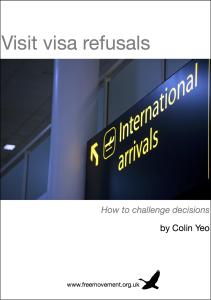- BY Colin Yeo

Family visit appeals abolished and bonds introduced
THANKS FOR READING
Older content is locked

A great deal of time and effort goes into producing the information on Free Movement, become a member of Free Movement to get unlimited access to all articles, and much, much more
TAKE FREE MOVEMENT FURTHER
By becoming a member of Free Movement, you not only support the hard-work that goes into maintaining the website, but get access to premium features;
- Single login for personal use
- FREE downloads of Free Movement ebooks
- Access to all Free Movement blog content
- Access to all our online training materials
- Access to our busy forums
- Downloadable CPD certificates

As of today the full right of appeal against refusal of a visit visa sponsored by a family member in the UK has been abolished. Combined with the recently announced pilot of £3,000 ‘bonds’ payable for visitors to the UK, it is clear the Government is making it increasingly difficult for visitors from certain countries, principally in south east Asia and Africa, to visit relatives here in the UK.
Family visit appeals
The Government’s view of family visit appeals is that they are needless and that a simple re-application with the right documents will be sufficient where there is a genuine case. Anyone who thinks this clearly has not spent a lot of time reading Entry Clearance Officer family visit refusals from posts such as Accra, Islamabad, Manila, Delhi or Lagos. ECOs regularly refuse visas for the most absurd reasons and once a person has been refused once it is a matter of routine to refuse future applications.
The full right of appeal against decisions made from today onwards may have been scrapped, but an appeal can still be pursued on human rights or race discrimination grounds. Given that the Home Office has long argued that family visits are a perfectly good family life alternative to residence in the same country, it may be hard for officials to argue now that family life is not engaged where a child wishes to visit a parent or a parent a child, whether the child is adult or not.
There is also the old tribunal case of Anand Ramsew v Entry Clearance Officer, Georgetown (01/TH/2505) 24th October 2001, in which Dr Storey emphasised that family visit appeals involved elements of Article 8 and that care should be taken in determining such appeals.
It would seem that all that is required for the right of appeal to be triggered is that human rights are engaged in some form, a relatively low threshold. This would enable the tribunal to make potentially helpful findings of fact even if the appeal ultimately failed on human rights grounds.
Race discrimination is rarely argued in the immigration tribunal because the tribunal itself has made it virtually impossible. The blatant racial discrimination exposed by the Chief Inspector of UKBA against Pakistanis could never have emerged through the tribunal system, which is timid and toothless. Similarly, the current secret list of countries against whom racial discrimination is authorised, made in a secret and unpublished ministerial order, seems highly unlikely to ever be challenged by means of the immigration tribunal.
Judicial review as an alternative
If the human rights appeal route is unsuitable or becomes so, judicial review against family visit refusals is likely to become commonplace. This is hardly a time or cost effective solution, but where re-applying has been tried it may be the only way for some individuals to challenge a visa refusal.
All immigration judicial reviews are being transferred into the Upper Tribunal, so if lawyers can streamline their processes the abolition of appeals may simply lead to the First-tier Tribunal being bypassed as a means of challenge against ECO decisions.
For further reading on whether to pursue an appeal on human rights grounds or opt for an application for judicial review, see this blog post: Visit visa refusals: appeal or judicial review?
Immigration bonds
If immigration bonds are introduced this will be a further major obstacle to visits to the UK from certain countries. Firstly, the bonds will be disproportionately and discriminatorily targeted against countries in south east Asia and Africa and secondly those targeted will find it very difficult indeed to find a £3,000 up front payment on top of their travel and other costs. It is another example of rights for the rich.
The measure was trailed in the media over the weekend and an official announcement was made yesterday on www.gov.uk. However, the announcement has mysteriously been removed, co-incidentally since the Lib Dems suddenly kicked up a fuss about the proposed level of the bonds, set at a whopping £3,000. You can still see the text of the official announcement on EIN if interested, as they wisely cut and pasted it before it vanished.
The announcement made clear that bonds for visitors was only the start:
The pilot will apply to visitor visas, but if the scheme is successful we’d like to be able to apply it on an intelligence-led basis on any visa route and any country.
The current Home Secretary seems hell bent on reducing immigration and being seen to reduce immigration. The measures used to achieve this political objective are not ‘intelligence-led’ at all, in fact, they are the dumbest of dumb blanket policies targeted against women, the poor and ethnic minorities.
For more detail on the new rules for visitors from April 2015 and a guide to the process of representing yourself through the legal process, see my full and updated ebook:
[downloads ids=”14398″ columns=”1″]SHARE


